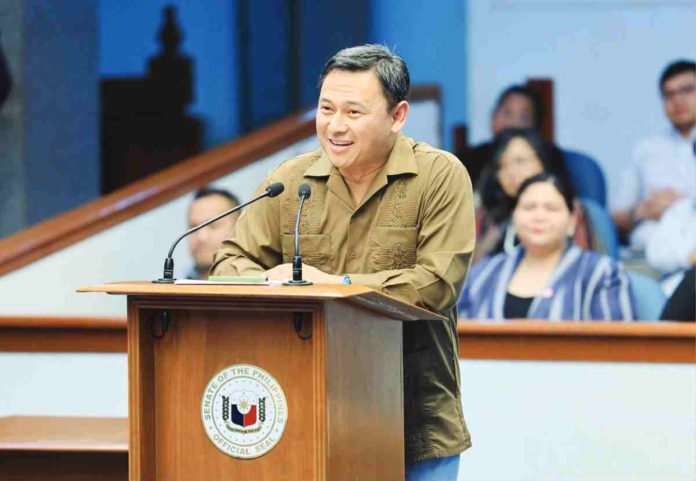
SENATOR Sonny Angara is confident the ongoing effort to amend the two decades-old Government Procurement Reform Act (GPRA) will result in greater efficiency in the implementation of projects, purchase of goods and supplies and reducing, if not eliminating avenues for corruption.
After three hearings and 10 technical working group meetings and months of consultations on the 13 bills dealing with the proposed amendments to Republic Act (RA) 9184 or the GPRA, Angara, as the chairman of the Committee on Finance, has sponsored the committee report on Senate Bill 2593, paving the way for the start of debates in plenary.
A priority measure identified by the Legislative-Executive Development Advisory Council, the amendments to the GPRA are expected to not only streamline the process of government procurement, but also to make it more effective.
“RA 9184, authored by my father, the late Senate President Edgardo Angara, was a landmark piece of legislation — recognized and lauded globally, including the World Bank. While it was able to institute key reforms in the government procurement process, over time individuals with evil intent have managed to find loopholes to exploit, costing the public billions that could have been spent on more productive endeavors,” Angara said.
The senator clarified that the wastage was not entirely due to corruption but also the inefficiencies of the government entities and the procurement process as a whole.
“We have seen agencies whose procurement of basic supplies take an inordinate amount of time to complete. There is a lack of true competition among bidders and oftentimes agencies are unable to undertake the procurement of goods due to poor planning or they are tied up by the procedures under the law,” Angara said.
A 2019 World Bank analysis of Philippine procurement data found that if the Philippines were to employ better procurement strategies and policies, it could save up to 29 percent of the total procurement spend.
Considering the years covered by the study (2014 to 2018), the savings would have amounted to P1.2 trillion.
Worldwide, public procurement makes up an average of 12 to 20 percent of a country’s GDP. For instance, the GDP of the Philippines in 2023 was equivalent to around P24.28 trillion so public procurement would amount to approximately P4.9 trillion.
The current administration is well aware of the problems with public procurement and President Ferdinand Marcos Jr. himself has highlighted the importance of pursuing further reforms in the GPRA.
In his last State of the Nation Address, the President said that such amendments are needed to make public procurement more attuned to the changing times, in a bid for government “not only to become more effective, but more, to become truly transformative.”
Among the amendments being pursued in the current review of the GPRA is the requirement for agencies to institute better planning and early procurement activities since a lot of the failures in the process are a result of poor planning.
A provision on the Most Economically Advantageous Responsive Bid (MEARB) will be introduced to address the issues encountered with the award criterion under RA 9184 of the Lowest Calculated Bid or simply put, awarding the contract to the least expensive bid. Based on feedback from the different agencies, this has resulted in the procurement of subpar or low-quality goods. With the MEARB, the awarding of bids will factor in quality, alongside cost.
The Department of Budget and Management would be tasked to create procurement positions for the different government agencies. This will ensure the professionalization of government procurement practitioners, who will have the qualifications needed to effectively fulfill their mandates.
There will be an emphasis on domestic preference in the supply of goods and services. This will not only broaden the options of government in sourcing their requirements, but will also help domestic industries grow and become more competitive.
“Ito’y aming sinama para ang gobyerno mismo ang mauuna sa pagsuporta ng mga ‘Tatak Pinoy’ na industriya para mas mabilis sila maging globally competitive,” said Angara who is the principal author and sponsor of RA 11981, or the Tatak Pinoy Act.
Consistent with Tatak Pinoy and the effort to encourage more microenterprises and startups to participate in the government procurement program, Angara said the GPRA will pave the way for a more inclusive process by ensuring there are equal opportunities for big and small players alike.
“Inaasahan namin na ang pagsasabatas ng reporma sa GPRA ay hindi lamang bibilis ang procurement ng gobyerno, ito’y magiging mas epektibo din. At sa ganitong paraan, iigting ang kapasidad ng gobyerno para tugunan ang pangangailangan ng sambayanang Pilipino. At kapag lalong gumanda at bumilis ang pag-responde, mas lalalim ang tiwala at panatag ng loob ng taong bayan sa ating gobyerno,” Angara said./PN




